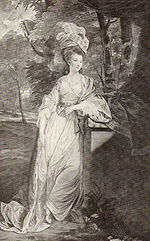- Charles Manners, 4th Duke of Rutland
-
For other people named Charles Manners, see Charles Manners (disambiguation).
 The 4th Duke of Rutland
The 4th Duke of Rutland
Charles Manners, 4th Duke of Rutland KG, PC (15 March 1754 – 24 October 1787) was a British politician and nobleman, the eldest legitimate son of John Manners, Marquess of Granby. He was styled Lord Roos from 1760 until 1770, and Marquess of Granby from 1770 until 1779.
He was educated at Eton and Trinity College, Cambridge, graduating the latter with a nobleman's MA in 1774.[1] That year, he was elected to one of the university's seats in the House of Commons. He continued to maintain the family's substantial electoral interests, and to collect objets d'art to decorate Belvoir Castle. He pledged to redeem his father's substantial debts, but was hampered by his passion for gambling.
On 26 December 1775, he married Lady Mary Isabella Somerset (d. 1831), daughter of Charles Somerset, 4th Duke of Beaufort and a celebrated beauty. They had six children:
- Lady Elizabeth Isabella Manners (d. 5 October 1853), married on 21 August 1798 Richard Norman
- John Manners, 5th Duke of Rutland (1778–1857)
- Lady Katherine Mary Manners (d. 1 May 1829), married on 16 June 1800 Cecil Weld-Forester, 1st Baron Forester
- General Lord Charles Henry Somerset Manners (24 October 1780 – 25 May 1855), died unmarried
- Major-General Lord Robert William Manners (14 December 1781 – 15 November 1835)
- Lord William Robert Albanac Manners (1783–1793)
Later in life, he was said to have been the lover of Elizabeth Billington.
Granby entered parliament in opposition to the North Ministry and as an ally to the Rockingham Whigs. He acted only as an observer until reaching his majority, and made his maiden speech on 5 April 1775, advocating free trade with the southern American Colonies. The speech brought him thanks from his father's friend Chatham, whom he praised, and initiated a friendship with William Pitt the Younger. It much disappointed the Court, and particularly Lord Mansfield, who had thought to govern the young Granby. During the American Revolution, he followed Chatham in urging reconciliation with America, and was one of those who questioned the conduct of Admiral Keppel in March 1779. He did not follow this up, and does not seem to have spoken in Parliament afterwards, acceeding to the dukedom on 29 May 1779. He was able to obtain a seat for his friend Pitt at Appleby in 1780 when Pitt failed of re-election for Cambridge University, and promised him a seat in one of the boroughs of the Rutland interest in the future. His own Parliamentary interest notwithstanding, he supported Pitt's plans for reform.
 The 4th Duke of Rutland
The 4th Duke of Rutland
With the entry of the French into the war, he became colonel of the Leicestershire militia, and was created Lord Lieutenant of Leicestershire on 9 July 1779, an honor bestowed by George III in person. On 30 October 1782, he was made a Knight of the Garter and was made Lord Steward of the Household[2] and sworn of the Privy Council on 17 February 1783. Shelburne thus brought him into the cabinet; but the appointment met with royal disfavor and prompted the resignation of Grafton and the collapse of the ministry. Rutland was by now an ally of Pitt, and upon his premiership, became Lord Privy Seal in December 1783.
Rutland was made Lord Lieutenant of Ireland on 11 February 1784. He was enthusiastic for Pitt's Irish policy and the union which it entailed, but became increasingly doubtful of its implementation. In 1785, Pitt and Rutland successfully worked a trade plan through the Irish Parliament, initially against the opposition of Henry Grattan and Henry Flood. However the Foxite opposition in the British House of Commons so gutted the measure with amendments that it was rejected in its new form in Ireland. While the Irish opposition was later reconciled to Pitt's bona fides with regard to trade, the episode demoralized Thomas Orde, the Chief Secretary of Ireland, and further hindered efforts at reform.
Rutland was increasingly popular as viceroy, in part because of his convivial nature and ample banquets at Dublin Castle. In summer 1787, he made an extended and rigorous tour of the midlands and north of Ireland, but his excessive consumption of claret was by now taking a toll upon his health. He died of liver disease on 24 October 1787 at Phoenix Park Lodge.
References
- ^ Granby, Charles (Manners), Marquess of in Venn, J. & J. A., Alumni Cantabrigienses, Cambridge University Press, 10 vols, 1922–1958.
- ^ During Rutland's term as Lord Steward of the Household, Lincoln's Inn barrister Levett Blackborne served him as his Steward of the Court of the Board of Green Cloth.
- Thorne, Roland (May 2006) [2004]. "Manners, Charles, fourth duke of Rutland (1754–1787)". Oxford Dictionary of National Biography. Oxford University Press. http://www.oxforddnb.com/view/article/17950. Retrieved 19 October 2006.
- Manners genealogy
- Leigh Rayment's Peerage Pages
Parliament of Great Britain Preceded by
Thomas Townshend
Richard CroftesMember of Parliament for Cambridge University
1774 – 1779
With: Richard CroftesSucceeded by
Richard Croftes
James MansfieldPolitical offices Preceded by
The Earl of CarlisleLord Steward
1783Succeeded by
The Earl of DartmouthLord Privy Seal
1783–1784Succeeded by
The Earl GowerPreceded by
The Earl of NorthingtonLord Lieutenant of Ireland
1784–1787Succeeded by
The Marquess of BuckinghamHonorary titles Preceded by
The Duke of RutlandLord Lieutenant of Leicestershire
1779–1787Succeeded by
The Duke of BeaufortPeerage of England Preceded by
John MannersDuke of Rutland
1779–1787Succeeded by
John Henry MannersCategories:- 1754 births
- 1787 deaths
- Alumni of Trinity College, Cambridge
- British MPs 1774–1780
- Dukes of Rutland
- Manners family
- Knights of the Garter
- Lord-Lieutenants of Leicestershire
- Lords Lieutenant of Ireland
- Lords Privy Seal
- Members of Parliament for the University of Cambridge
- Members of the Parliament of Great Britain for English constituencies
- Old Etonians
- Members of the Parliament of Great Britain for university constituencies
Wikimedia Foundation. 2010.

